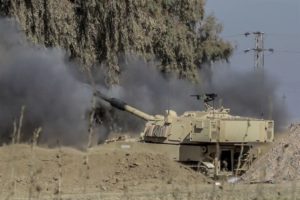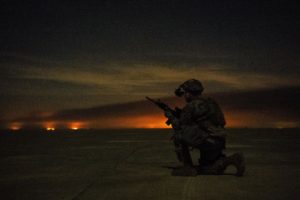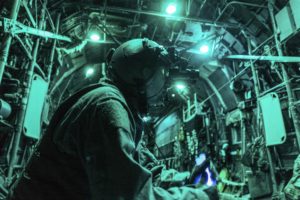The U.S.-backed offensive to retake Iraq’s Mosul from the Islamic State is inflicting hardships on civilians, but the Western media treats this humanitarian crisis differently than the recent one in Aleppo, Syria, notes Steven Chovanec.
By Steven Chovanec
During the Syrian army’s offensive to retake the eastern part of Aleppo from the insurgent opposition, the Western media portrayed the assault as if Russia and Syria were carrying out a campaign primarily aimed at killing and harming civilians. The humanitarian crisis dominated headlines while key facts, such as
Al Qaeda’s domination of the opposition forces and the way in which the militants had brutally conquered the city’s civilians, were marginalized or not reported at all.
A similar military offensive being carried out by the U.S. and its allies in the Iraqi city of Mosul reveals the hypocritical nature of Western news outlets, which portray their own countries’ actions as targeting only Islamic State terrorists and scrupulously avoiding harm to civilians.
There is no doubt that the siege in eastern Aleppo resulted in a humanitarian crisis for the civilian population trapped within the warzone. As the Washington Institute’s
Fabrice Balanche described: “What the United Nations is describing [about] the humanitarian situation is correct: hospitals destroyed, people living in shelters, women and children trapped in the rubble, and so on.”
Yet in reality the destruction waged upon Aleppo was hardly different from what is now being done in Mosul as the U.S.-led coalition carries out a similar campaign of counterinsurgency and siege warfare.
Currently the Iraqi army, backed by U.S. airstrikes, is conducting a violent and brutal assault on the western parts of Mosul city in order to drive out the Islamic State. A whole population of civilians is
trapped within an ongoing warzone and cut off from
food supplies and basic necessities as the military offensive hits heavily populated areas
killing civilians while
destroying important infrastructure in the process, including
hospitals.
Yet, while Western officials and media pundits vehemently condemned the Syrian assault on Aleppo, they are largely silent — or congratulatory and supportive — as the U.S. and its partners lay waste to the more heavily populated city of Mosul.
A senior Iraqi politician told veteran journalist Patrick Cockburn that “the Iraqi armed forces will eventually capture west Mosul …
but the city itself will be destroyed in the fighting,” pointing to the massive destruction already inflicted upon eastern Mosul which was recently captured by the U.S.-backed forces.
So, even though the current U.S.-led siege has resulted in a larger humanitarian crisis in purely quantitative terms, the outcry over it is largely nonexistent. The trauma is reported on, but selectively, while the full extent of the civilian catastrophe is hidden from view.
For instance, The New York Times dedicated only two major stories to the offensive this month, yet flooded its pages with heartrending stories during the siege of Aleppo. In addition, coalition actions in Mosul that result in civilian casualties, like the destruction of
hospital complexes, are depicted as justified or unintentional, compared to the portrayal of Syrian and Russian strikes in east Aleppo as intentional war crimes when similar complexes were hit or civilians killed.
Similarly, justifications for civilian suffering — scoffed at and ridiculed when made by Russia and Syria — are used without irony or shame to defend U.S. actions. Whereas the West’s media treated civilians in Aleppo as the targeted victims of the Russian-Syrian attacks, civilians in Mosul are described as “human shield” victims of Islamic State terrorists who also hoard food supplies and prevent civilians from escaping.
This is not to say that these accusations against the Islamic State are false, but similar Russian-Syrian claims against the Al Qaeda-dominated rebels in east Aleppo were brushed aside as lies and propaganda.
A Dire Situation
Without doubt, the conditions on the ground in ISIS-held western Mosul are dire. Aid groups warn that the situation has been deteriorating rapidly following
a U.S.-backed coalition airstrike that destroyed the last remaining bridge leading out of the city, trapping the population and preventing supplies from entering. The coalition justified the attack as necessary to cut off ISIS from supply lines, but that also had drastic humanitarian implications.
“Humanitarian conditions in the west of the city are deteriorating after supply routes were cut off in November when the east of the city was recaptured,”
Oxfam reported. “An estimated 750,000 people are trapped in western Mosul without any safe means of escape from the latest military offensive.”
The result is that “up to 750,000 people in western Mosul city are estimated to remain largely inaccessible to humanitarians,”
the U.N. warned, while “serious concerns remain for the protection of civilians in the west of the city, where food, water, medicine and fuel are running low.”
Patrick Cockburn, one of the few honest Western journalists reporting on the region, noted that “already shelling and airstrikes are causing heavy casualties among families sheltering in cellars or beneath the stairs in their houses.”
Writing for Middle East Eye, Nafeez Ahmed quoted Ross Caputi, a Marine veteran of the Iraq War,
describing “horror stories about civilian casualties coming out of Mosul. An aid worker friend of mine was trying to recruit volunteer doctors to work in a surgical unit in Erbil, where many of the more serious cases were being redirected. She told me that the situation is worse than it’s being portrayed in the media.”
Even more startling is evidence that the first week of March was characterized by a severe rise in civilian deaths as a result of U.S.-coalition actions, at the same time when major news outlets had drastically reduced coverage on the topic.
“The US-led coalition fighting the Islamic State
may have killed hundreds of civilians” in the first week of March alone, according to open source data compiled by
Airwars, which estimates that “between 250 and 370 civilians have been killed” since March 1. Nafeez Ahmed
explained this is “exponentially higher than the US count of just 21 civilian deaths from bombing since November 2016.”
Yet, instead of highlighting the humanitarian crisis and placing blame on U.S. and Iraqi forces for the misery, the Western media has portrayed the operation as assiduously avoiding harm to civilians. For example, the coalition strike severing the bridge was described as a victory against ISIS, while the humanitarian implications were downplayed or ignored.
One report described the destruction of the bridge as “a historic setback for the Islamic State as the terror group loses its grip on its Iraqi hub of Mosul,” with no mention of the harm to civilians.
Another stated “American-led airstrikes damaged all five bridges last year in a bid to isolate the militants in Mosul.”
At least one of the ruined bridges was captured recently by Iraqi government forces. But U.S. Air Force Col. (and spokesman for the coalition) John Dorrian made it clear that bridges would be fully repaired “
only after defeating ISIS,” choosing to intensify the humanitarian crisis by continuing a debilitating siege on the almost one million residents who are trapped.
Perhaps the destruction of bridges and siege warfare are warranted to isolate and defeat the Islamic State, yet when main news outlets deliberately hide the humanitarian implications of such actions and portray them merely as military victories without connection to the human suffering, they are engaged in manipulation of public perceptions which mobilizes support for state actions rather than objectively informing public opinion of the reality of the situation.
Stephen Gowanz summed up the nature of this media bias: “the United States and its allies have been practicing siege warfare in the Levant and beyond for years, and continue to do so. It’s just that US-led siege warfare has been concealed behind anodyne, even heroic, labels, while the siege warfare of countries Washington is hostile to, is abominated by Western state officials crying crocodile tears.”
Manufactured Consent
The reason for this hypocrisy is that the primary function of mass media in “free societies” is to serve as a system of propaganda. Under this “propaganda model” view of the media, one would expect Western coverage of the Mosul crisis to take for granted that the U.S. is carrying out its efforts in the service of benevolent ideals, with the goal of defending civilians from aggression and terrorism while making painstaking efforts to limit casualties.
On the other hand, in the Aleppo case, one would expect Western media to act in the opposite fashion, taking for granted that civilian lives are treated with contempt and that motives are inherently suspicious or malevolent, while context and rational understanding of actions are marginalized or disregarded altogether.
When comparing coverage of these two stories, we see that this is exactly what you find, namely indignation directed at “enemy” military operations over civilian suffering and sympathy for U.S. and allied military assaults with the civilian casualties downplayed or rationalized.
Edward Herman and Noam Chomsky explain in their extensive study on media propaganda,
Manufacturing Consent, that “while this differential treatment occurs on a large scale, the media, intellectuals, and public are able to remain unconscious of the fact and maintain a high moral and self-righteous tone. This is evidence of an extremely effective propaganda system.”
The question is
how does this occur when the news media is not openly controlled by a state bureaucracy as in a totalitarian system but nonetheless achieves similar outcomes. An institutional analysis reveals that there exist various factors inherit within the structure of the media which essentially serve as a filter which sifts out inconvenient facts while propagating other information that is in accordance with the interests of the institution.
The basic structure of Western media is that the outlets themselves are powerful corporations with a profit-making goal. The product that they are selling are audiences, mostly wealthier and privileged people, as consumers of advertisements paid for by other major corporations. Given this reality, it’s not surprising that the news product reflects a worldview that is in alignment with corporate interests and prejudices, such as the military defense contractors and the military itself whose ads line the pages of major Western journals and consume significant ad time on TV.
It is in the interests of these pro-military entities for audiences to get a positive image of the U.S. military while creating an adverse image for foreign villains who can be collectively despised. It’s also understood that American audiences want to feel good about what the U.S. military is doing abroad, rather than being challenged with unpleasant truths.
Herman and Chomsky explain that this phenomenon of slanted reporting “is normally not accomplished by crude intervention, but by the selection of right-thinking personnel and by the editors’ and working journalists’ internalization of priorities and definitions of news-worthiness that conform to the institutions policy.”
The result is an extremely skewed media picture, which is determined by which side of the geopolitical struggle certain actions occur. In the cases of Mosul and Aleppo, the similarities of the tragedies that have devastated the two cities serve to further highlight the very dissimilar way in which the two stories have been reported.
Steven Chovanec is an independent geopolitical analyst and writer based in Chicago, IL. He has a bachelors in International Relations and Sociology at Roosevelt University and conducts independent, open-source research into geopolitics and social issues. His writings can be found at undergroundreports.blogspot.com, find him on Twitter @stevechovanec.






